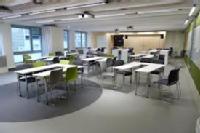Open Space Learning
Open-space Learning or OSL
Open-space Learning, or OSL, is a pedagogic methodology that was created, developed, and practiced at the University of Warwick beginning in 2007, and that continues to be disseminated. OSL is an interdisciplinary, or better, a transdisciplinary, pedagogy, that seeks to challenge the lecture and seminar mode that dominates as the teaching orthodoxy in most British universities. The pedagogy is dependent on the use of physically 'open' spaces - in the sense that tables and chairs are absent - and an 'open' approach to intellectual content and the role of the tutor. Participants in OSL, typically but not exclusively, learn in an 'embodied' way. Thomas Docherty writes the following in his introduction to a recent publication on the subject: 'In OSL we open public space as well as the private spaces in which we learn. The project explores how it is we can enhance what is fashionably called the student experience of learning. Experience involves risk-taking, it involves experiment, it involves not knowing the outcome of particular areas of exploration, but being willing to take the opportunity that the opening of a space affords them. The students whose work is central to this project come from diverse disciplines but they come together in the driving open of a space in which they also make time, they make time for learning. OSL is an opening to time and to history. It offers, maybe for the first time in our times, the real risk of a student experience.' [1]
Origins
OSL developed from the work of Warwick's CAPITAL Centre (Creativity and Performance in Teaching and Learning), which was one of the Higher Education Funding Councils of England's (HEFCE) CETLs (Centres of Excellence in Teaching and Learning.) CAPITAL was a collaboration between the Institute of Education at Warwick, the Department of English, and the Royal Shakespeare Company. The basic idea was to apply the practices and theories of the theatrical rehearsal room and the theatrical ensemble across a university curriculum. From these early aspirations developed a pedagogy that has now been used successfully in a dozen departments including Chemistry, Law, Business, English, Mathematics, Philosophy, and Medicine.
Methods
The workshop is the fundamental activity in pedagogic interaction between facilitator and participant in OSL. The workshop is best described as 'a teaching and learning session that takes place in an environment in which participants can engage actively with the learning materials that are that session’s focus. Such materials might include text, but they might also include props, objects, and audio-visual materials. Participants work independently, or in small groups, with these materials in order to fashion or create their own knowledge. The workshop allows the participants to become the producers of knowledge. The space itself is fundamental in preventing the reformation of the rigidly hierarchical space of lecture theatre and seminar room.' [2] Examples of OSL activities include 'still image' or 'tableau', in which participants embody sometimes abstract ideas; 'theory building', in which participants create a narrative, a concept, or a 'theory' from a collection of materials relating to a particular subject; and simulation and role-play.
Theory
OSL employs methods such as ‘enactive’ learning, ‘kinaesthetic’ learning and the various styles of teaching developed by practitioners such as Augusto Boal and Paulo Freire. Theoretically the work owes its greatest debt to thinkers like Vygotsky, Howard Gardner, and David A. Kolb. In terms of the suggestion that it promotes a style of teaching and learning that seeks to undermine a Cartesian separation of mind and body, its greatest debt is to work in Neuroscience by academics such as Andy Clark, and to phenomenology of the kind developed by Husserl. OSL also has connections to ‘applied drama’, ‘applied theatre’, or ‘applied performance’. OSL can include any kind of learning in which the participants are required to engage with both mind and body in a workshop environment, and promotes a combination of 'mindfulness' and 'playfulness'. Further detail is available on the OSL website, and in Open-space Learning: a Transdisciplinary Pedagogy.[3]
Technology
OSL approaches are often dependent upon removing obstacles and mediations between bodies and minds. They can have a positively disruptive relationship to digital technologies. Where participants in challenging learning situations might ordinarily seek escape into the internet, OSL brings them back to a more immediate and unmediated presence. This has the potential to frame and question digitally-dependent habits, if handled carefully. Technology may then be reintroduced, carefully and with conscious awareness of potential effects, to extend the time and place in which OSL occurs and has effect.
References
[1] Monk, Nicholas, Jonathan Heron, Jonathan Neelands, Carol Chillington Rutter. Open-space Learning: a Study in Interdisciplinary Pedagogy. London: Bloomsbury, 2011. Bloomsbury Interdisciplinary Studies in the Humanities. Print and Web. p.vi
[2] http://www2.warwick.ac.uk/fac/cross_fac/iatl/projects/osl-final/introduction/workshop_model/ Accessed 22 September 2011.
[3] Monk, Nicholas, Jonathan Heron, Jonathan Neelands, Carol Chillington Rutter. Open-space Learning: a Study in Interdisciplinary Pedagogy. London: Bloomsbury, 2011. Bloomsbury Interdisciplinary Studies in the Humanities. Print and Web.
OSL projects at Warwick
Open-space Learning in Real World Contexts is a project funded at Warwick by the Higher Education Academy's National Teaching Fellowship Scheme 2009-11. The OSL project brought together three National Teaching Fellows from Education, Creative Writing and E-Learning at the CAPITAL Centre, a CETL exploring creativity and performance in teaching and learning, to develop and embed new forms of creative pedagogy associated with workshop practice and collaborative learning in flexible teaching spaces. Since summer 2010 it has been hosted by Warwick's Institute for Advanced Teaching and Learning.

